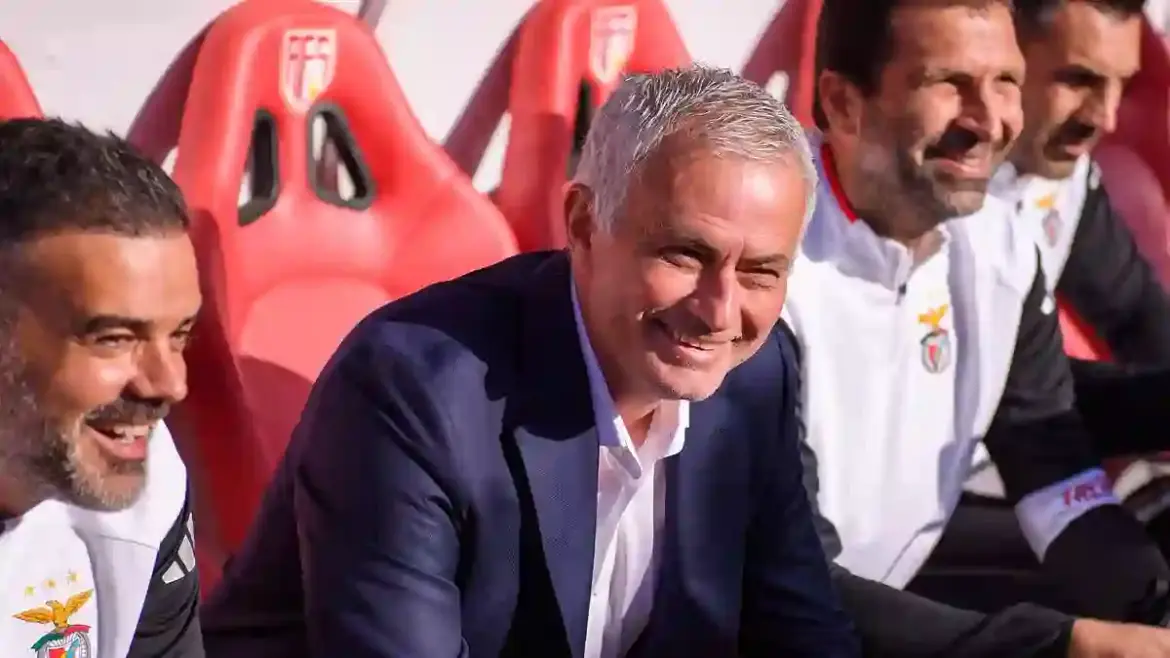On a sunny afternoon in Seixal, just outside Lisbon, all talk is about one man — José Mourinho.
Over plates of grilled sardines in a tucked-away restaurant near Benfica’s training ground, locals are swapping stories about the “Special One” and his long-awaited homecoming.
It’s been 25 years since Mourinho first sat in the Benfica dugout, and now he’s back where his managerial journey began.
One diner, Jorge Batista, proudly recalls growing up with Mourinho in Setúbal.
He even shows a faded photograph of them as teenagers on the same team. For him, the return of Mourinho isn’t just a footballing story — it’s personal history.
From Azeitao to the Benfica Dugout
These days, Mourinho lives quietly with his family in Azeitão, a wine town in the hills, a far cry from his solitary stint in Istanbul last year.
Back then, while managing Fenerbahçe, he lived out of a hotel and often slipped into kebab shops in disguise.
Batista insists his old friend has always loved Benfica, and he’s convinced Mourinho will deliver trophies this time around.
It’s worth remembering how it began: in 2000, a 37-year-old Mourinho had his first taste of management with Benfica.
But after only three months, a contract dispute saw him walk away.
Now, with more than 1,000 games and ten clubs behind him, he’s back to finish what he never really started.
New Start After Turkish Struggles
Mourinho’s Benfica adventure comes hot on the heels of a difficult spell in Turkey.
His time at Fenerbahçe ended abruptly, with fans and officials alike frustrated by poor performances and his combative style.
A Champions League exit to Benfica, of all teams, sealed his fate.
He admits himself that Turkey wasn’t the right fit — culturally, professionally, or personally.
By the time he left, his relationship with the club had soured, and his once-intimidating aura was dimmed. Now, Lisbon offers a chance at redemption.
A Different Mourinho or the Same Ego?
When he arrived, Mourinho insisted he was less self-centered and more focused on others — the players, the fans, the board.
But not everyone buys it. Former Chelsea midfielder John Obi Mikel, who knows Mourinho well, says the Portuguese thrives on ego and can’t function without it.
Mourinho, however, brushes off the idea of “unfinished business” with Benfica, instead calling this a fresh chapter.
For him, managing in the Champions League again, after five years away, was too tempting to turn down.
Politics, Pressure, and Timing
This return also has a political edge. With Benfica’s presidential elections looming in October, Rui Costa needed a big statement.
Hiring Mourinho certainly fits the bill, though sources suggest the move may not have happened if elections weren’t around the corner.
Costa insists Mourinho has taken a pay cut compared to his previous jobs, proof of his desire to come home.
Interestingly, a unique clause in his contract allows either side to walk away cheaply just days after the season ends.
The Fans and the First Impressions
On the pitch, Mourinho has steadied the ship, taking seven points from his first three games.
Off the pitch, he’s wasted no time stamping his authority.
He’s been living at the training ground to maximize work time, even opening part of training to the media — a rare move at Benfica.
But fans are split. Some see him as a savior, others as a risky short-term fix.
The Estádio da Luz was packed with 58,000 fans for his latest game, though still shy of full capacity.
For now, he’s a symbol of hope, but Lisbon supporters are notoriously demanding.
A Tough Week Ahead
The real test begins this week. Benfica face Chelsea in the Champions League, followed by a domestic clash with Porto.
Both clubs hold special significance for Mourinho, making the stakes even higher.
Lose these games, and the excitement of his return could quickly turn sour.
Still Driven, Still Fighting
Mourinho admits he still feels “hurt” watching Chelsea’s struggles since Abramovich sold the club, but insists he wants to build new success rather than live off past glories.
After all, two of his last three jobs ended without silverware — a rarity for a man once considered the best manager in the world.
Despite setbacks, his hunger remains. He may have mellowed in some ways, but the fire still burns.
As one Portuguese journalist put it, Benfica fans see Mourinho as “a new dream” — but they also know dreams can fade quickly.
Legacy and the Road Ahead
Twenty-five years, ten clubs, and 26 trophies later, José Mourinho still commands attention.
Whether he can turn Benfica into winners again or whether this is just another short-lived chapter remains to be seen.
What’s certain is that Lisbon feels like home, and for Mourinho, there’s always one more battle to fight.
As he once said himself: “If you die by your ideas, you are stupid.” For now, at least, Mourinho is still very much alive in the game.
